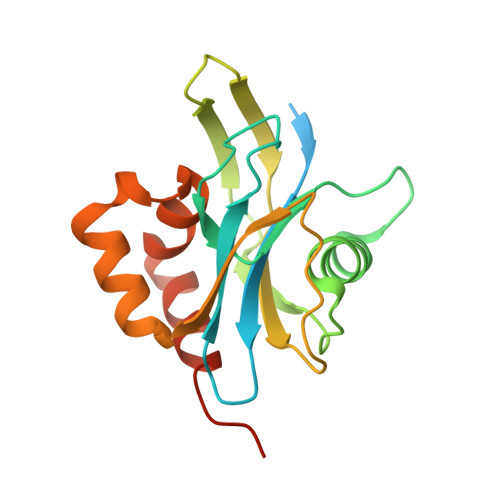Crystal structure of isopentenyl diphosphate:dimethylallyl diphosphate isomerase.
Durbecq, V., Sainz, G., Oudjama, Y., Clantin, B., Bompard-Gilles, C., Tricot, C., Caillet, J., Stalon, V., Droogmans, L., Villeret, V.(2001) EMBO J 20: 1530-1537
- PubMed: 11285217
- DOI: https://doi.org/10.1093/emboj/20.7.1530
- Primary Citation of Related Structures:
1HX3, 1HZT - PubMed Abstract:
Isopentenyl diphosphate:dimethylallyl diphosphate (IPP:DMAPP) isomerase catalyses a crucial activation step in the isoprenoid biosynthesis pathway. This enzyme is responsible for the isomerization of the carbon-carbon double bond of IPP to create the potent electrophile DMAPP. DMAPP then alkylates other molecules, including IPP, to initiate the extraordinary variety of isoprenoid compounds found in nature. The crystal structures of free and metal-bound Escherichia coli IPP isomerase reveal critical active site features underlying its catalytic mechanism. The enzyme requires one Mn(2+) or Mg(2+) ion to fold in its active conformation, forming a distorted octahedral metal coordination site composed of three histidines and two glutamates and located in the active site. Two critical residues, C67 and E116, face each other within the active site, close to the metal-binding site. The structures are compatible with a mechanism in which the cysteine initiates the reaction by protonating the carbon-carbon double bond, with the antarafacial rearrangement ultimately achieved by one of the glutamates involved in the metal coordination sphere. W161 may stabilize the highly reactive carbocation generated during the reaction through quadrupole- charge interaction.
Organizational Affiliation:
Laboratoire de Microbiologie, Université Libre de Bruxelles, 1 avenue E.Gryson, 1070 Bruxelles, Belgium.














